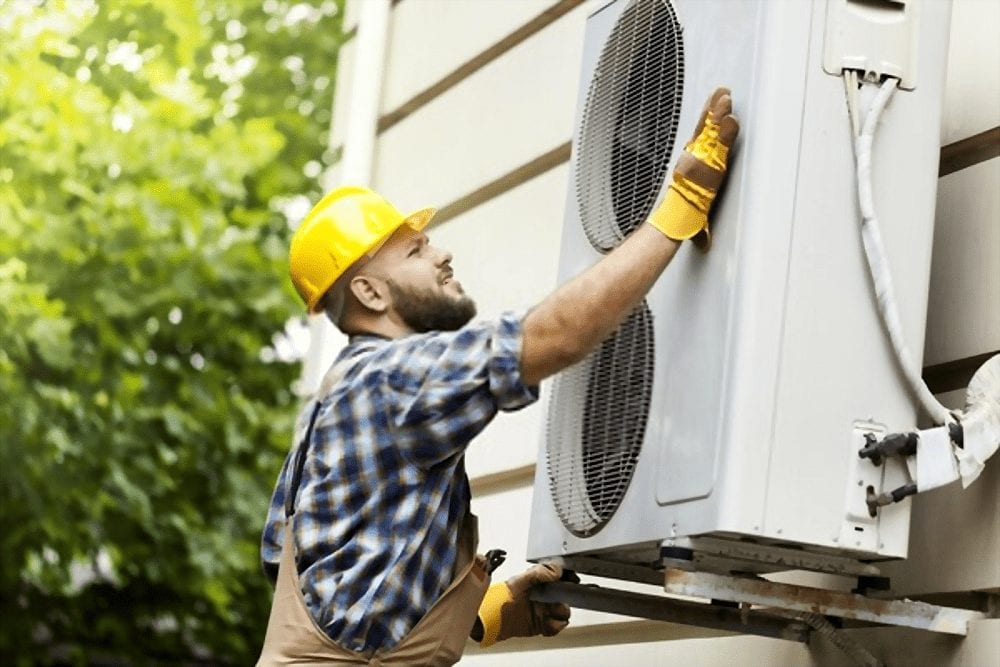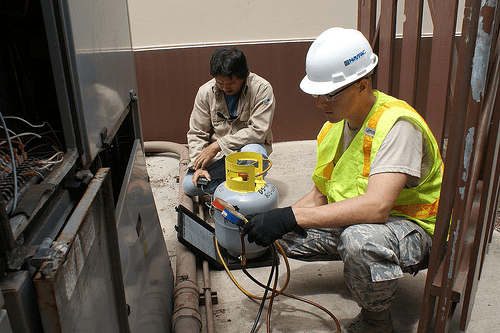Selecting Between a Heatpump and Heater: Secret Considerations for Your Heating And Cooling Requirements
When reviewing heating alternatives for cooling and heating needs, the choice in between a heat pump and a heating system can be complicated. Each system supplies distinctive advantages customized to details environments and power effectiveness goals. Recognizing these differences is vital for making an informed choice. Secret variables such as installment costs and environmental effect additionally make complex the choice procedure. Which option really lines up with one's comfort and sustainability choices? The following sections will explore these factors to consider thoroughly.
Recognizing Heat Pumps: Just How They Work and Their Benefits
While lots of house owners take into consideration numerous heating alternatives, understanding how heatpump function and their benefits can greatly affect their choice. Heatpump operate by transferring heat instead of producing it. In the winter season, they draw out warmth from the outdoors air or ground and transfer it indoors, while in the summertime, they reverse this process, cooling down the home by getting rid of warmth outside. This twin capability makes them flexible for year-round climate control.One of the main advantages of warmth pumps is their power effectiveness. They utilize substantially less electrical energy compared to standard heater, potentially causing lower utility bills (furnace replacement). In addition, heatpump have a smaller carbon footprint, making them an eco friendly choice. They likewise call for much less upkeep than standard systems, adding to long-term expense savings. In general, recognizing the mechanics and advantages of heatpump can aid home owners make notified decisions regarding their heating and cooling down demands
Exploring Furnaces: Kinds, Procedure, and Benefits
Furnaces come in various types, consisting of gas, electrical, and oil designs, each with distinct operational mechanisms. Understanding these differences is necessary, as they influence performance and home heating efficiency. Furthermore, furnaces supply numerous advantages, such as regular heat output and reliability in colder climates.
Kinds of Heating systems
Home heating systems can vary considerably in style and procedure, with heating systems being a popular choice amongst house owners. There are a number of kinds of furnaces, each utilizing different fuel sources and technologies. Gas heaters are usual, leveraging all-natural gas to generate warm effectively. Electric furnaces, on the various other hand, use electric resistance to generate heat, commonly preferred for their simple installation. Oil heating systems, while less usual, work in areas with minimal gas gain access to (furnace replacement). Furthermore, condensing furnaces optimize power performance by recording and reusing exhaust gases. Each kind operates via a system of heat exchangers and ductwork to disperse warm air throughout a home. Recognizing the distinctions in between these furnace types is crucial for informed cooling and heating decisions
Benefits of Heating systems
For home owners seeking trustworthy heat throughout chilly months, the benefits of furnaces are considerable. Heaters offer regular heating, making sure also temperature levels throughout the home. They are particularly efficient in extreme chilly, usually surpassing warm pumps in freezing conditions. Different kinds, consisting of gas, electrical, and oil furnaces, supply flexibility to fulfill varied requirements and preferences.Furnaces also have a tendency to have lower initial setup costs compared to warmth pumps, making them a more available choice for lots of. Their durable style adds to a longer life-span, with lots of units lasting over 15 years with appropriate upkeep. Additionally, modern-day heaters are commonly outfitted with sophisticated modern technology for enhanced efficiency, which can bring about minimized energy bills. Generally, heating systems stay a dependable selection for reliable home heating.

Power Performance: Contrasting Warm Pumps and Furnaces
When contrasting energy efficiency between heatpump and furnaces, the Seasonal Power Performance Proportion (SEER) plays an essential duty in establishing efficiency. In addition, a functional expense analysis exposes the long-lasting financial implications of each system. Comprehending these aspects can direct home owners in making educated choices regarding their heating services.
Seasonal Power Performance Proportion
Power efficiency plays a vital function in the decision-making process in between heatpump and heaters, particularly when considering the Seasonal Power Efficiency Proportion (SEER) This metric steps the cooling efficiency of heatpump over an entire air conditioning season, providing a standardized way to examine performance. Higher SEER rankings indicate greater power effectiveness, converting to lower power usage and lowered utility costs. On the other hand, heating systems are normally assessed utilizing the Annual Gas Utilization Effectiveness (AFUE) ranking, which shows home heating efficiency. When contrasting these 2 systems, homeowners must focus on SEER rankings for heatpump, as they directly influence general power savings and environmental sustainability. A comprehensive understanding of SEER can especially affect the long-term satisfaction and cost-effectiveness of the selected cooling and heating service.
Operational Cost Evaluation
Recognizing the operational costs related to warmth pumps and furnaces is essential for homeowners assessing their options. Warm pumps typically provide greater power effectiveness, converting electrical energy into warm with very little waste. This leads to reduced monthly utility costs, specifically in moderate environments. Conversely, standard heating systems, particularly gas versions, might have lower upfront prices but can sustain greater operational costs in time because of sustain prices and efficiency ratings.Moreover, warm pumps can work as both you could try these out heating and cooling down systems, possibly reducing the requirement for separate HVAC systems. While first financial investments for heatpump might be greater, their lasting financial savings in energy performance can make them a much more economical choice for many homes. Mindful analysis of neighborhood power prices is important to determine the finest choice.
Setup Costs: What to Expect for every Heating System
Setup prices for furnace can vary substantially in between warm pumps and heaters, affecting house owners' decisions. Heat pumps generally have greater in advance installation expenses, typically ranging from $3,500 to $8,000, depending upon the unit size and complexity of installation. This consists of the outdoor device, indoor handling system, and needed ductwork modifications. Alternatively, furnaces often tend to have lower initial expenses, balancing between $2,500 and $6,000, which can be appealing for budget-conscious homeowners. Nevertheless, setup expenses can enhance if substantial ductwork is required.Moreover, the choice of gas kind for heaters-- all-natural gas, gas, or electrical-- can also influence installment prices. While warmth pumps supply energy efficiency, their preliminary investment might deter some buyers. Eventually, evaluating installation expenses along with long-term savings and performance will certainly aid homeowners in making informed choices concerning their heating unit.
Climate Considerations: Which System Does Much Better in Your Area
How do environment conditions influence the performance of heater? The performance of warmth pumps and heating systems can vary considerably relying on the local environment. In moderate climates, heat pumps succeed by successfully transferring heat from the outside air, making them an energy-saving option. Nevertheless, their performance reduces in extremely cool temperatures, where they may have a hard time to extract adequate warm. Alternatively, heaters, especially gas models, give dependable and consistent heat despite outside conditions, making them more suitable in colder regions.In areas that experience milder winters months, heatpump can operate efficiently year-round, giving both heating & cooling. In comparison, regions with extreme winters months commonly profit from the effectiveness of furnaces. Eventually, recognizing the regional environment is necessary when choosing between a heatpump and a heating system, as it directly affects their operational performance and total performance.
Upkeep Needs: Long-Term Care for Warmth Pumps vs. Furnaces
While both warm pumps and heating systems require normal maintenance to ensure peak efficiency, their specific demands and care routines vary significantly. Heaters commonly need much less frequent interest, with yearly assessments being adequate to look for gas leaks, clean filters, and assess general capability. Their simpler design frequently enables for simple repairs.In comparison, warm pumps require biannual upkeep as a result of their double role in cooling and heating. This consists of cleansing coils, checking refrigerant levels, and ensuring that both the exterior and interior systems operate at their best. In addition, heatpump maintenance commonly imp source includes even more intricate components, making expert servicing essential.Neglecting maintenance can cause diminished performance and enhanced power prices for both systems. Inevitably, property owners should consider these long-term care demands when picking in between a heatpump and a heater, as aggressive upkeep can prolong the life-span and performance of either system considerably.
Environmental Effect: Selecting a Lasting Home Heating Choice
The ecological impact of furnace is a vital evaluation for home owners seeking lasting choices. Heatpump are generally much more energy-efficient than typical furnaces, as they transfer warm as opposed to produce it, substantially reducing carbon exhausts. By utilizing renewable resource resources, such as air-source or geothermal heatpump, house owners can additionally minimize their environmental footprint.On the other hand, gas heaters give off greenhouse gases and add to air pollution, though they often provide higher warmth outcome. Improvements in modern technology have led to the advancement of high-efficiency heaters that lessen emissions.Ultimately, selecting a home heating system entails considering performance versus ecological effect. Home owners are motivated to review local power sources and rewards for renewable systems, guaranteeing a selection that lines up with both individual comfort and ecological duty. The decision affects not only immediate convenience but likewise long-term sustainability and ecological health and wellness.
Regularly Asked Questions
How Much Time Do Heat Pumps and Furnaces Commonly Last?
The lifespan of heatpump commonly ranges from 15 to twenty years, while heaters can last between 15 to thirty years. Normal upkeep substantially impacts their long life and performance in providing heating solutions.
Can I Utilize a Heatpump in Very Cold Climates?
Heatpump can run in incredibly cool climates, however their performance lessens as temperatures decrease. In such conditions, extra home heating sources might be necessary to maintain comfy indoor temperature levels and assure peak efficiency.

What Is the Noise Level of Warmth Pumps Versus Furnaces?
The sound levels of warm pumps and heaters differ significantly. Generally, heat pumps run more silently than conventional heaters, making them more effective for those sensitive to seem, while furnaces may produce louder functional noises throughout heating cycles.
Are Warmth Pumps Suitable for Both Cooling And Heating?
Heatpump are undoubtedly suitable for both heating & cooling (ductless mini splits). They function by transferring warmth, providing efficient temperature level control year-round, making them a versatile option for house owners seeking an all-in-one a/c solution
What Dimension Furnace Do I Required for My Home?
Determining the appropriate size home heating system for a home needs evaluating variables such as square discover here video footage, insulation top quality, local climate, and the home's format. Consulting an expert can assure an exact analysis and perfect convenience. Warmth pumps typically offer higher energy efficiency, converting electrical energy right into heat with minimal waste. In moderate climates, warm pumps excel by efficiently transferring heat from the outside air, making them an energy-saving choice. Alternatively, heaters, particularly gas models, offer reliable and consistent warmth no matter of exterior problems, making them preferable in colder regions.In locations that experience milder winters months, warmth pumps can operate effectively year-round, providing both home heating and air conditioning. Heat pumps are normally more energy-efficient than conventional heating systems, as they transfer heat instead than generate it, greatly decreasing carbon discharges. By utilizing renewable power sources, such as geothermal or air-source heat pumps, house owners can additionally reduce their ecological footprint.On the other hand, all-natural gas heating systems give off greenhouse gases and contribute to air pollution, though they typically offer greater warm output.